Links within this page: Key Dates | Tracks: Communities of Special Interest (COSIs) | Submission Guidelines | Review Criteria | Poster Details | FAQ
We invite abstracts for research that is topical to bioinformatics and computational biology, which is in progress (unpublished, formerly Late-Breaking Research) or previously published within the last 18 months (previously Highlights Track) for consideration for oral and/or poster presentation.
Your abstract should be submitted to the Communities of Special Interest (COSI) Track that most accurately reflects the area of the work. (You will have the option to identify two other COSI tracks that may also be suited to your research area during your submission). You can learn more about COSIs here.
Talks and posters are organized according to scientific topics which are covered by the COSIs listed below. Please note, abstracts are not limited to COSI topics and if the topic of your submission falls outside the listed COSIs you can choose the "General Computational Biology" area. Your abstract should convey a scientific result and should not be an advertisement for any commercial software package.
Multiple talks: The same talk is not permitted to be given more than once as an oral presentation at ISMB/ECCB 2021. Research may presented as both a talk and poster. Having the same person deliver two (or more) different talks is possible (and not prohibited), but it is not encouraged. This allows for many people from one lab to present the work of the lab. Although a presenting author may present one poster in Poster Session A and Poster Session B we encourage labs to involve multiple attendees.
Key Dates
| Updated May 19, 2021 | |
|---|---|
| Monday, February 1, 2021 | Call for Abstracts Opens |
| Thursday, May 6, 2021 | Abstracts Submission Deadline (closes at 11:59 p.m. May 6, Eastern Daylight Time) |
| Monday, May 10, 2021 | Late Posters Submissions Open |
| Thursday, May 27, 2021 | Talk and/or Poster Acceptance Notifications |
| Monday, May 31, 2021 | CAMDA Extended Abstracts Deadline |
| Thursday, June 3, 2021 | Late Posters Submissions Deadline (closes at 11:59 p.m. June 3, Eastern Daylight Time) |
| Thursday, June 10, 2021 | Late Posters Acceptance Notifications |
| Thursday, June 10, 2021 | CAMDA Acceptance Notification |
| Sunday, June 20 | Last day for Presenters to have completed release forms, confirmation of participation (form sent by ISMB) |
| Sunday, June 20 | Last day for Presenting Authors and Poster Authors registration to be completed |
| Wednesday, June 30, 2021 | Last day to provide Pre-recorded talk presentations for virtual conference platform (no changes to video permitted following upload) |
| Monday, July 19, 2021 | Poster presentations uploaded through accepted poster delegate profile on conference platform beginning July 19 and no later than July 23. |
Any recent research, published or unpublished is eligible for submission and should be received by May 6, 2021. Acceptance notifications will be sent no later than Thursday, May 27, 2021. The conference will accept late posters abstracts beginning May 10, 2021.
Poster only submissions DO NOT require any materials to be uploaded. Submissions are evaluated on the 200 word text abstract provided during submission.
Tracks: Communities of Special Interest (COSIs)
• 3DSIG • Bio-Ontologies • BioInfo-Core • BioVis • BOSC • CAMDA • CompMS • Education • EvolCompG • Function • HiTSeq • iRNA • MLCSB • MICROBIOME • NetBio • RegSys • SysMod • Text Mining • TransMed • VarI • General Computational Biology •
3DSIG: Structural Bioinformatics and Computational BiophysicsAbstract Area Chairs:Iris Antes, Technical University of Munich, Germany Douglas Pires, The University of Melbourne, Australia Rafael Najmanovich,, Université de Montreal, Canada |
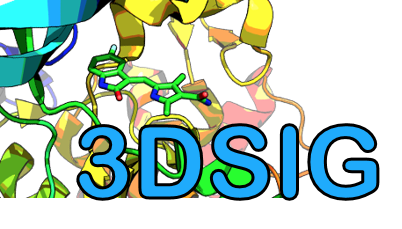 It is impossible to fully understand biological systems without understanding the 3D structure of their constituting parts and their interactions. As such the topics relevant for 3DSIG are wide and include, but are not restricted to Structure-based drug discovery including polypharmacology and network pharmacology; Structure representation, classification and prediction; It is impossible to fully understand biological systems without understanding the 3D structure of their constituting parts and their interactions. As such the topics relevant for 3DSIG are wide and include, but are not restricted to Structure-based drug discovery including polypharmacology and network pharmacology; Structure representation, classification and prediction;Structure-based function prediction; Docking, analysis, prediction and simulation of biomolecular interactions such as protein-protein, protein-ligand and protein-nucleic-acid; Protein dynamics and disorder; Evolution studied through structures; Application of structure to systems biology; Macromolecular assemblies; Structural genomics; 3D databases and data mining; Molecular visualization; Relevant methods of structure determination particularly hybrid methods; Prediction and analysis of protein domains; Membrane protein structure analysis and prediction; The structural basis of immunology.
|
Bio-OntologiesAbstract Area Chairs:Tiffany Callahan, University of Colorado Denver, United States Robert Hoehndorf, King Abdullah University of Science and Technology, Saudi Arabia Learn more about the Bio-Ontologies here |
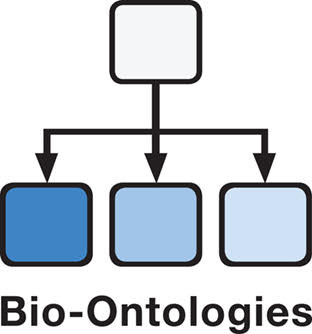 Bio-Ontologies Community of Special Interest Group (COSI) covers the latest and most innovative research in the application of ontologies, the organisation and dissemination of knowledge, and the development and application of knowledge-based methods in biomedicine and life sciences. Bio-Ontologies Community of Special Interest Group (COSI) covers the latest and most innovative research in the application of ontologies, the organisation and dissemination of knowledge, and the development and application of knowledge-based methods in biomedicine and life sciences.Bio-Ontologies provides a vibrant environment for reporting novel methods and sharing experiences on the construction and application of ontologies in health care and the life sciences. The informal nature of the COSI offers a constructive environment to nurture discussion of innovative and scientifically sound work that range from preliminary to completed, from both young and experienced investigators alike. Bio-Ontologies participants also benefit from a strongly interdisciplinary setting, where ISMB attendees intermingle with members from American Medical Informatics Association (AMIA) and the W3C’s Healthcare and Life Sciences interest group (HCLSIG), thereby increasing impact through broader dissemination and enabling new and exceptional collaborations.
|
BioInfo-CoreAbstract Area Chairs:Madelaine Gogol, Stowers Institute, United States Rodrigo Ortega Polo, Agriculture and Agri-Food Canada Alberto Riva, University of Florida, United States Learn more about Bioinfo-core here |
 Bioinfo-core is a worldwide body of people that manage or staff bioinformatics cores within organizations of all types including academia, academic medical centers, medical schools, biotechs and pharmas. Bioinfo-core is a worldwide body of people that manage or staff bioinformatics cores within organizations of all types including academia, academic medical centers, medical schools, biotechs and pharmas.*Accepting submissions for posters only* |
BOSC: Bioinformatics Open Source ConferenceAbstract Area Chairs:Nomi L. Harris, Lawrence Berkeley National Laboratory, United States Karsten Hokamp, Trinity College Dublin, Ireland Learn more about BOSC here |
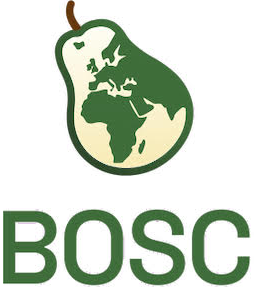 BOSC covers all aspects of open science / open source bioinformatics, including standards and ontologies; approaches that promote open science and sharing of data, results and software; bioinformatics tools and libraries; and ways to grow open source communities while promoting diversity within them. BOSC covers all aspects of open science / open source bioinformatics, including standards and ontologies; approaches that promote open science and sharing of data, results and software; bioinformatics tools and libraries; and ways to grow open source communities while promoting diversity within them.Launched in 2000 and held yearly since then, BOSC is organized by the Open Bioinformatics Foundation (OBF), a non-profit group dedicated to promoting the practice and philosophy of open source software development and open science within the biological research community.
Keywords: Open source; Open science; Open data; Reproducible research; Interoperability; Data science; Workflows; Translational bioinformatics; Diversifying bioinformatics communities. |
BioVis: Biological Data VisualizationAbstract Area Chairs:Danielle Albers Szafir, University of Colorado at Boulder, United States Jan Byška, Masaryk University, Czech Republic Helena Jambor, TU Dresden, Germany Learn more about the BioVis COSI here |
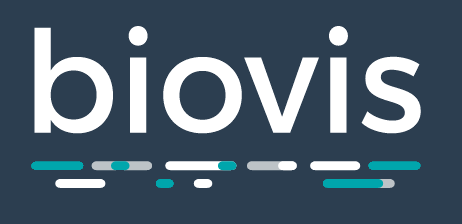 The BioVis track aims to educate, inspire, and engage bioinformatics and biology researchers in state-of-the-art visualization research and visualization researchers in problems in biological data visualization. The BioVis track aims to educate, inspire, and engage bioinformatics and biology researchers in state-of-the-art visualization research and visualization researchers in problems in biological data visualization.The rapid adoption of data-intensive biology approaches creates enormous challenges for computational visualization techniques, which are needed to enable researchers to gain insight from their large and highly complex data sets. The goal of this session is to bring together researchers from the visualization, bioinformatics, and biology communities with the purpose of educating, inspiring, and engaging bioinformatics and biology researchers in state-of-the-art visualization research, as well as visualization researchers in problems in biological data visualization.
Keywords: Visualisation, Visual Analytics, Education |
CAMDA: Critical Assessment of Massive Data AnalysisAbstract Area Chairs:David Kreil, Boku University Vienna, Austria Joaquin Dopazo, Fundación Progreso y Salud, Spain Paweł P Łabaj, Austrian Academy of Sciences, and Jagiellonian University, Poland Wenzhong Xiao, Harvard Medical School, United States (NOTE: CAMDA submitters should include a 3-5 page long abstract PDF) Learn more about the CAMDA COSI here. |
 The large, complex data sets for the Critical Assessment of Massive Data Analysis (CAMDA) contest include built-in truths for calibration. In an open-ended competition, however, both seasoned researchers and cunning students push the boundaries of our field, with unexpected questions or angles of approach often bringing the most impressive advances. The large, complex data sets for the Critical Assessment of Massive Data Analysis (CAMDA) contest include built-in truths for calibration. In an open-ended competition, however, both seasoned researchers and cunning students push the boundaries of our field, with unexpected questions or angles of approach often bringing the most impressive advances.The CAMDA track highlights and compares the latest methods and results in an international data analysis contest, with this year's topics including: (1) a cancer prognosis data-integration challenge, now with RNA-seq reads for multiple cancer types introducing 300Mb of new human genomic sequence, (2) a CMap drug safety challenge of comparing / integrating multi-track responses of multiple cell lines for predicting the severity of drug induced liver injury in humans from a range of cell line assays, and (3) a meta-genomics geolocation challenge of constructing multi-source microbiome fingerprints in the context of climate data and predicting the geographical origin or ecological niche of mystery samples.
|
CompMS: Computational Mass SpectrometryAbstract Area Chairs:Wout Bittremieux, University of California San Diego, United States Isabell Bludau, Max Planck Institute of Biochemistry, Germany Lindsay Pino, University of Pennsylvania, United States Timo Sachsenberg, University of Tübingen, Germany Learn more about the CompMS COSI here. |
 COSI CompMS promotes the efficient, high-quality analysis of mass spectrometry data through dissemination and training in existing approaches and coordination of new, innovative approaches. COSI CompMS promotes the efficient, high-quality analysis of mass spectrometry data through dissemination and training in existing approaches and coordination of new, innovative approaches.The COSI aims to build a community of scientists working in computational mass spectrometry, to integrate experimental with theoretical research, and to bridge the gap between proteomics, metabolomics, and other MS-driven fields Keyword: computational mass spectrometry, proteomics, metabolomics
|
Education: Computational Biology EducationAbstract Area Chair:Patricia M. Palagi, SIB Swiss Institute of Bioinformatics, Switzerland Learn more about the Education COSI here. |
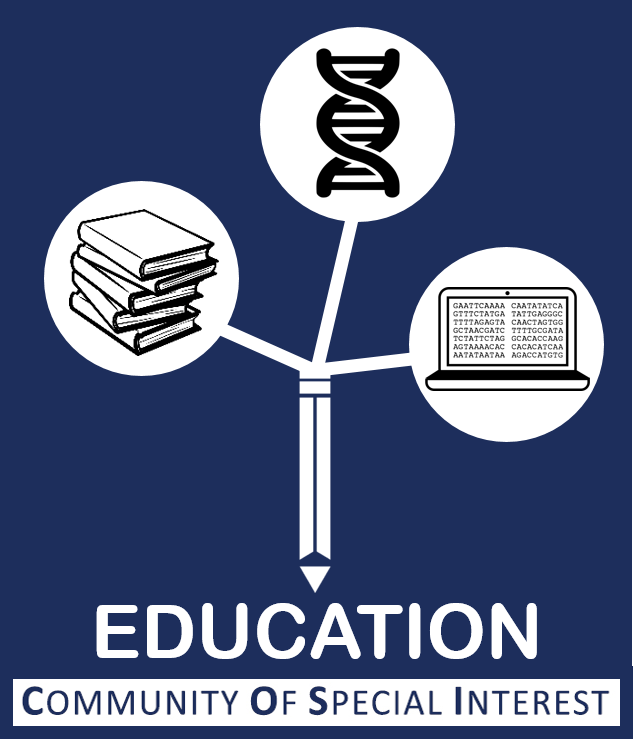 Education-COSI focuses on bioinformatics and computational biology education and training across the life sciences. Education-COSI focuses on bioinformatics and computational biology education and training across the life sciences.A major goal of this COSI is to foster a mutually supportive, collaborative community in which bioscientists can share bioinformatics education and training resources and experiences, and facilitate the development of education programs, courses, curricula, etc., and teaching tools and methods.
Keywords: education, training, training resources, curricula, competencies |
EvolCompGen: Evolution and Comparative GenomicsAbstract Area Chairs:Edward L. Braun, University of Florida, United States Janani Ravi, Michigan State University, United States Giltae Song, Pusan National University, Korea Learn more about the EvolCompGen COSI here |
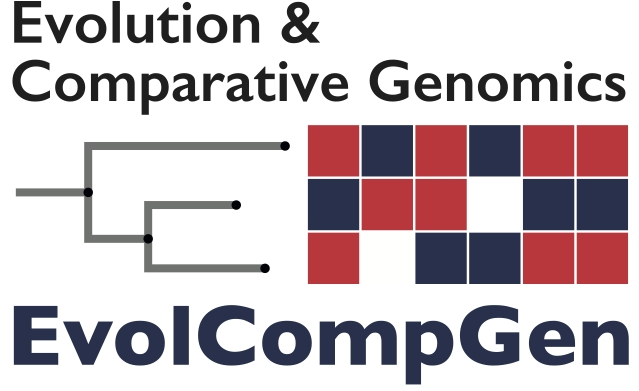 Evolution and comparative genomics are deeply intertwined with computational biology. Computational evolutionary methods, such as phylogenetic inference methods or multiple sequence alignment are widely used, yet remain far from “solved” and are indeed intense areas of research. Evolution and comparative genomics are deeply intertwined with computational biology. Computational evolutionary methods, such as phylogenetic inference methods or multiple sequence alignment are widely used, yet remain far from “solved” and are indeed intense areas of research.At the same time, evolutionary and comparative genomics are inherently “transversal” disciplines in that work in many other biological areas of research have some evolutionary component (e.g. cancer genomics, epidemiology, toxicology, population genetics, functional genomics, structural biology just to name a few). The scope of this COSI is intentionally kept broad. The track will feature a mix of proceedings, highlight, and invited talks. Priority will be given to contributions which are relevant to more than a single area of application, or to contributions which are not covered by more specialised COSIs.
Keywords: Evolution, phylogeny, phylogenomics, comparative genomics, genome rearrangements, orthology, paralogy, recombination, lateral gene transfer, genome variation, population genomics, comparative epigenomics, epidemiology, cancer evolution genomics, genome annotation |
Function: Gene and Protein Function AnnotationAbstract Area Chairs:Iddo Friedberg, Iowa State University, United States Kim Reynolds, University of Texas Southwestern Medical Center, United States Mark Wass, University of Kent, United Kingdom Learn more about the Function COSI here |
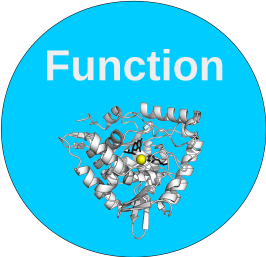 The mission of the Function Community of Special Interest (Function-COSI) is to bring together computational biologists, experimental biologists, biocurators, and others who are dealing with the important problem of gene and gene product function prediction, to share ideas and create collaborations. The mission of the Function Community of Special Interest (Function-COSI) is to bring together computational biologists, experimental biologists, biocurators, and others who are dealing with the important problem of gene and gene product function prediction, to share ideas and create collaborations.The Function COSI features the Critical Assessment of Function Annotation, an ongoing community challenge aimed at improving methods for protein function prediction. The Function-COSI holds annual meetings alongside ISMB. Also, we are conducting the multi-year Critical Assessment of protein Function Annotation, or CAFA, experiment.
Keywords: Protein function prediction, machine learning, performance assessment, |
HiTSeq: High-throughput SequencingAbstract Area Chairs:Can Alkan, Bilkent University, Turkey Ana Conesa, University of Florida, United States Francisco M. De La Vega, Stanford University, United States Dirk Evers, Dr. Dirk Evers Consulting, Germany Kjong Lehmann, ETH-Zürich, Switzerland Learn more about the HiTSeq COSI here |
 HiTSeq is a community of special interest devoted to the latest advances in computational techniques for the analysis of high-throughput sequencing (HTS) data. Sessions will be devoted to discussing the latest advances in computational techniques for the analysis of high-throughput sequencing (HTS) datasets and will provide a forum for in-depth presentations of the methods and discussions among the academic and industry scientists working in this field. HiTSeq is a community of special interest devoted to the latest advances in computational techniques for the analysis of high-throughput sequencing (HTS) data. Sessions will be devoted to discussing the latest advances in computational techniques for the analysis of high-throughput sequencing (HTS) datasets and will provide a forum for in-depth presentations of the methods and discussions among the academic and industry scientists working in this field.We seek contributions on any topic involving HTS data analysis including: genome assembly and haplotype phasing; transcriptome analysis; genetics and epigenetics variation; metagenomics and microbiome analysis; and new HTS platform data analysis (e.g. synthetic reads, long reads, nanopore). In addition to general sessions, we propose to have two specialized sessions to focus on current hot topics: a) long sequencing and mapping techniques, b) single cell sequencing applications, c) non-linear genome representations. Both of these topics have generated an enormous amount of interest recently.
Keywords: sequencing, next generation, high throughput, algorithms, assembly, phasing, variation discovery, genotyping, metagenomics, microbiome, long reads, short reads, nanopre, pan-genomes, graph genomes |
iRNA: Integrative RNA BiologyAbstract Area Chairs:Athma Pai, University of Massachusetts Medical School, United States Klemens Hertel, UC Irvine, United States Michelle Scott, University of Sherbrooke, Canada Yoseph Barash, University of Pennsylvania, United States Learn more about the iRNA COSI here |
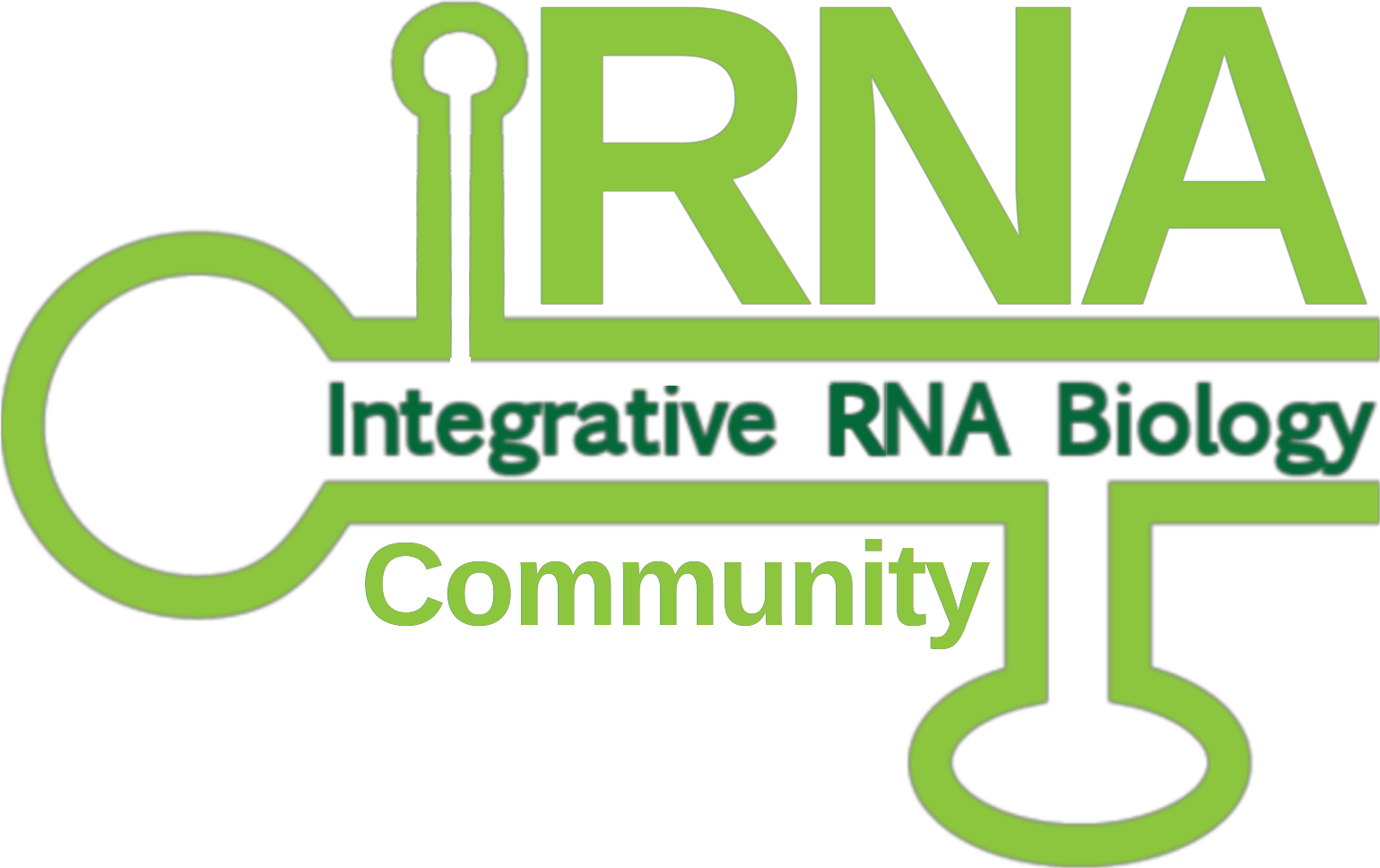 iRNA track covers the full range of research topics in the field of RNA Biology, from computational and high-throughput experimental methods development to their application in different aspects of RNA processing, structure, and function. iRNA track covers the full range of research topics in the field of RNA Biology, from computational and high-throughput experimental methods development to their application in different aspects of RNA processing, structure, and function.The goal of the Integrative RNA Biology session is to bring together experts in computational and experimental aspects of research in RNA Biology to cover new developments across this broad field of research. The meeting focuses on two major areas: (1) the development of computational and high-throughput experimental methods, and (2) the application of such methods to break new grounds in the study of RNA biology and disease. We aim to educate and inspire researchers in the field, novice and seasoned alike, by meshing together different aspects of Computational RNA Biology, and promoting cross-disciplinary collaborative research.
Keywords: Transcriptomics, RNA processing, post-transcriptional regulation, non-coding RNA, RNA 2D/3D structure, alternative-splicing, alternative polyadenylation, RNA translation degragation and localization, genetic variants effect on RNA processing, RNA and disease. |
MLCSB: Machine Learning in Computational and Systems BiologyAbstract Area Chairs:Anshul Kundaje, Stanford University, United States Gabriele Schweikert, Dundee University, Scotland Learn more about the MLCSB COSI here |
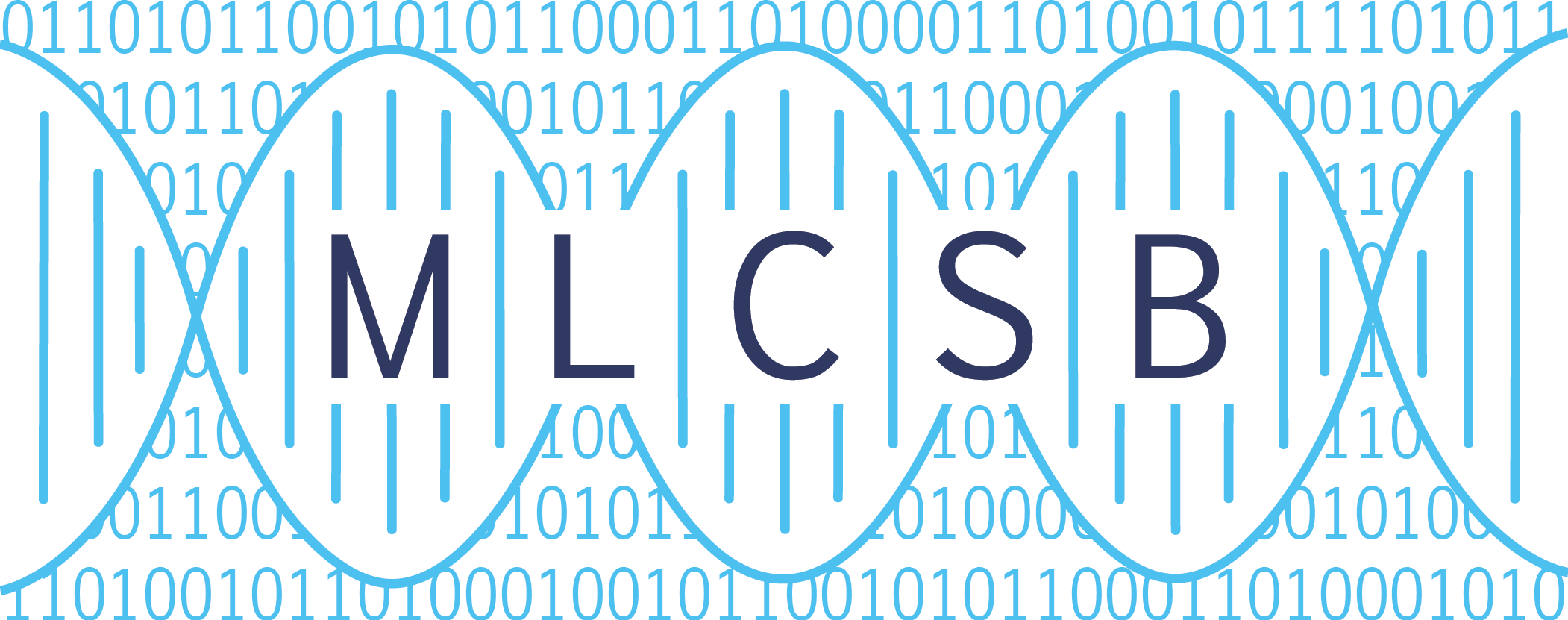 Systems Biology and Machine Learning meet in the MLCSB COSI. The community is the place for researchers of these areas to exchange ideas, interact and collaborate. Systems Biology and Machine Learning meet in the MLCSB COSI. The community is the place for researchers of these areas to exchange ideas, interact and collaborate.Molecular biology and all the biomedical sciences are undergoing a true revolution as a result of the emergence and growing impact of a series of new disciplines and tools sharing the -omics suffix in their name. These include in particular genomics, transcriptomics, proteomics and metabolomics, devoted respectively to the examination of the entire systems of genes, transcripts, proteins and metabolites present in a given cell or tissue type. Taking advantage of this wealth of genomic information has become a conditio sine qua non for whoever has the ambition to remain competitive in molecular biology and in the biomedical sciences in general. Machine learning naturally appears as one of the main drivers of progress in this context, where most of the targets of interest deal with complex structured objects: sequences, 2D and 3D structures or interaction networks. At the same time, bioinformatics and systems biology have already induced significant new developments of general interest in machine learning, for example in the context of learning with structured data, graph inference, semi-supervised learning, system identification, and novel combinations of optimization and learning algorithms.
Keywords: Machine Learning, Data Mining, Deep Learning, Artificial Intelligence in Bioinformatics and Computational Biology |
MICROBIOMEAbstract Area Chairs:Thea Van Rossum, EMBL Heidelberg, Germany Zhong Wang, Joint Genome Institute, United States Learn more about the MICROBIOME COSI here |
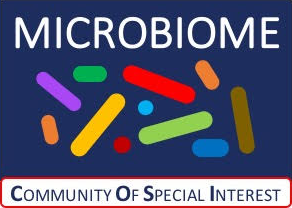 The MICROBIOME Community of Special Interest aims at the advancement and evaluation of computational methods in microbiome research, especially metaomic approaches. Based on the Critical Assessment of Metagenome Interpretation (CAMI), the COSI supplies users and developers with exhaustive quantitative data about the performance of methods in relevant scenarios. The MICROBIOME Community of Special Interest aims at the advancement and evaluation of computational methods in microbiome research, especially metaomic approaches. Based on the Critical Assessment of Metagenome Interpretation (CAMI), the COSI supplies users and developers with exhaustive quantitative data about the performance of methods in relevant scenarios.It therefore guides users in the selection and application of methods and in their proper interpretation. Furthermore, the COSI provides a platform for exchange and networking between method developers, and provides valuable information allowing them to identify promising directions for their future work.
Keywords: microbiome, computational metaomics, microbial networks, pathogens, symbionts, (meta)omics-based diagnostics, microbial ecology and evolution |
NetBio: Network BiologyAbstract Area Chair:Martina Kutmon, Maastricht University, Netherlands Learn more about the NetBio COSI here |
 As large scale, systems-level data are becoming increasingly available, modeling and analyzing them as networks is widespread. Network Biology Community serves to introduce novel methods and tools, identify best practices and highlight the latest research in the growing and interdisciplinary field of network biology. As large scale, systems-level data are becoming increasingly available, modeling and analyzing them as networks is widespread. Network Biology Community serves to introduce novel methods and tools, identify best practices and highlight the latest research in the growing and interdisciplinary field of network biology.Keywords: networks, pathways, systems, network analysis, disease networks, disease pathways |
RegSys: Regulatory and Systems GenomicsAbstract Area Chairs:Shaun Mahony, Penn State University, United States Anthony Mathelier, University of Oslo, Norway Judith Zaugg, EMBL, Germany Learn more about the RegSys COSI here |
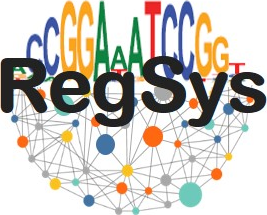 Regulatory genomics involves the study of the genomic control system, which determines how, when and where to activate the blueprint encoded in the genome. Regulatory genomics is the topic of much research activity worldwide. Since computational methods are important in the study of gene regulation, the RegSys COSI meeting focuses on bioinformatics for regulatory genomics. Regulatory genomics involves the study of the genomic control system, which determines how, when and where to activate the blueprint encoded in the genome. Regulatory genomics is the topic of much research activity worldwide. Since computational methods are important in the study of gene regulation, the RegSys COSI meeting focuses on bioinformatics for regulatory genomics.An important goal of the meeting is to foster a collaborative community wherein scientists convene to solve difficult research problems in all areas of computational regulatory genomics.
Keywords: 1. Genomic and epigenomic regulatory elements (transcription factors, enhancers, histones, gene promoters, regulatory motifs, non-coding RNAs, etc.) 2. NGS methods in regulatory genomics (e.g., ChIP-seq, RNA-seq, ATAC-seq) 3. Epigenetics and epitranscriptomics 4. Alternative splicing 5. Regulatory networks and pathway analysis 6. Genetic, molecular, and phenotypic variation in human disease 7. DNA shape 8. Single-cell transcriptomics (and other single cell assays) 9. 3D genomics (e.g., Hi-C and ChIA-PET) 10. Regulatory evolution or comparative regulatory genomics |
SysMod: Computational Modeling of Biological SystemsAbstract Area Chairs:Laurence Calzone, Institut Curie, France Claudine Chaouiya, Aix-Marseille Université, France Andreas Dräger, University of Tübingen, Germany María Rodríguez Matínez, IBM Research Europe, Switzerland Juilee Thakar, University of Rochester Medical Center, United States Learn more about the SysMod COSI here |
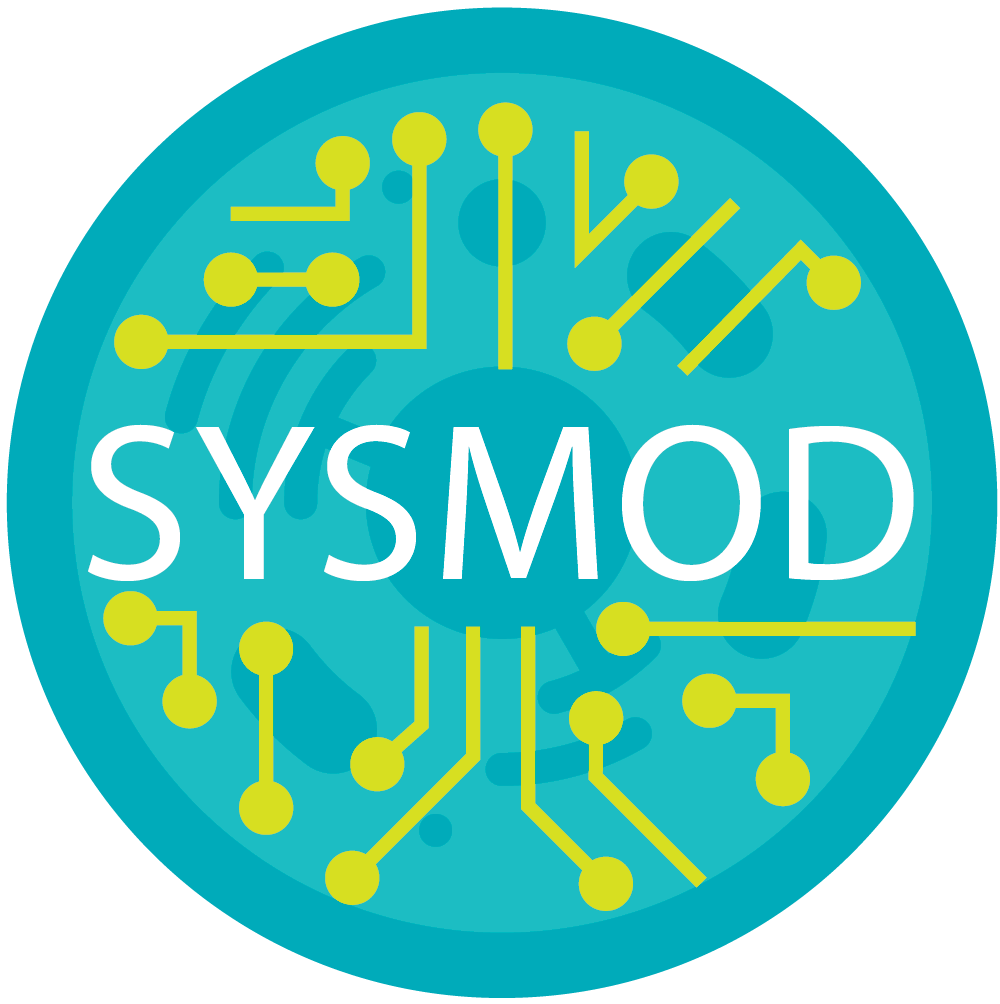 The Computational Modeling of Biological Systems (SysMod) aims to create a forum for systems modelers and bioinformaticians to discuss common research questions and methods. The session will focus on the conjoint use of mathematical modeling and bioinformatics to understand biological systems functions and dysfunctions. The Computational Modeling of Biological Systems (SysMod) aims to create a forum for systems modelers and bioinformaticians to discuss common research questions and methods. The session will focus on the conjoint use of mathematical modeling and bioinformatics to understand biological systems functions and dysfunctions.The meeting is open to the full range of methods used in systems modeling, including qualitative and quantitative modeling, dynamical and steady-state modeling, as well all applications of systems modeling including basic science, bioengineering, and medicine.
Keywords: computational modeling, constraint-based models, logical models, kinetic models, multi-scale models |
Text Mining: Text Mining in BioinformaticsAbstract Area Chairs:Cecilia Arighi, University of Delaware, United States Robert Leaman, NCBI/NLM/NIH, United States Learn more about the Text Mining Special Session here |
 This session brings together researchers that create text mining tools with researchers who currently use or are interested in using text mining tools to make new discoveries. The primary goal is to link at least two distinct audiences: those who are not text mining specialists, but who could use the results in their work (e.g., bioinformaticians and computational biologists), This session brings together researchers that create text mining tools with researchers who currently use or are interested in using text mining tools to make new discoveries. The primary goal is to link at least two distinct audiences: those who are not text mining specialists, but who could use the results in their work (e.g., bioinformaticians and computational biologists),and biomedical text mining specialists who develop new methodologies to advance the state of the art. The session will focus on text mining use cases (concrete problems with scientific importance) in addition to methodology development.
|
TransMed: Translational Medical InformaticsAbstract Area Chairs:Irina Balaur, University of Luxembourg Wei Gu, University of Luxembourg Venkata Satagopam, University of Luxembourg Mansoor Saqi, Kings College London, United Kingdom Maria Secrier, University College London, United Kingdom Learn more about the TransMed COSI here. |
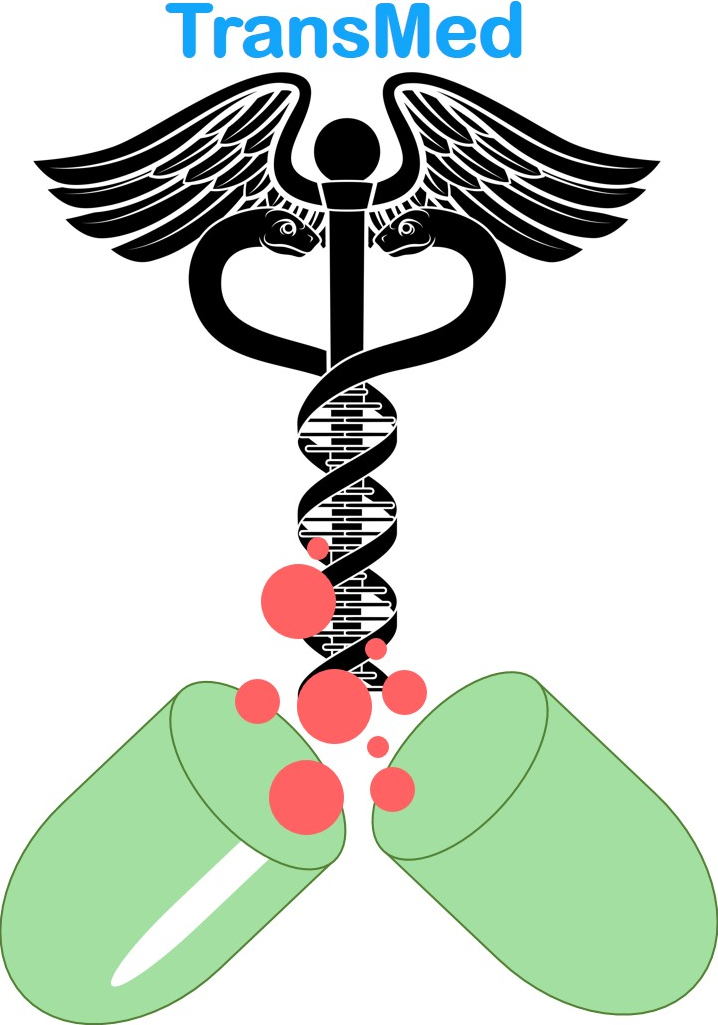 TransMed covers the current developments in the field of clinical and translational medicine informatics. Analysis of large amounts of multi-omics, imaging (medical and molecular), mobile sensor, clinical and health records data is paving the way for precision medicine. In the TransMed track, we will explore the current status of computational biology and advance machine learning approaches within the field of clinical and translational medicine. TransMed covers the current developments in the field of clinical and translational medicine informatics. Analysis of large amounts of multi-omics, imaging (medical and molecular), mobile sensor, clinical and health records data is paving the way for precision medicine. In the TransMed track, we will explore the current status of computational biology and advance machine learning approaches within the field of clinical and translational medicine.This opens the debate on current state-of-the-art data infrastructures for translational medicine data integration and analysis. A variety of computational approaches are currently being used to harmonize and relate molecular data to clinical outcomes in order to better understand disease conditions. These methods also have the potential to discover biomarkers for early detection of disease, and targets for drug discovery, and to be used predictively to help to suggest personalised therapeutic strategies for patients. In this session we will bring scientists from both academia and industry to exchange knowledge and foster networking, to help in building up of the translational medicine community. .
Keywords: Translational medicine; clinical and ‘omics data integration; curation and harmonization; stratification of patients; informatics for integrating biology and the bedside; medical informatics; ontology-driven data representation; patient centered outcomes research; cohort data; deep learning |
VarI: Variant InterpretationAbstract Area Chairs:Emidio Capriotti, University of Bologna, Italy Hannah Carter, University of California, San Diego, United States Antonio Rausell, Imagine Institute for Genetic Diseases, France Learn more about the VarI COSI here |
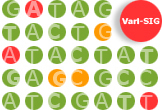 The VarI COSI meeting is dedicated to the recent advances in the analysis and interpretation of the genetic variants. The VarI COSI meeting is dedicated to the recent advances in the analysis and interpretation of the genetic variants.The meeting aims to organize a research network (VarI-COSI) facilitating the exchange of ideas and the establishment of new collaborations between researchers with different expertise. The VarI-COSI meeting is broadly divided in two sessions (“Genetic variants as markers: evolution, populations, GWAS” and “Genetic variants as effectors: function, structure, and regulation”) that encompass the four major research topics of the field: 1) Databases, data mining algorithms and visualization tools for variants analysis. 2) Methods for predicting regulatory/structural/functional impacts of SNVs. 3) Personal Genomics, GWAS studies and SNV prioritization. 4) Population genomics and phylogenetic analysis.
|
General Computational BiologyAbstract Area Chairs:Xin Gao, King Abdullah University of Science and Technology, Saudi Arabia Xuegong Zhang, Tsinghua University, China (If all other areas are insufficiently descriptive of your work, please submit to the area below. Please note that the submissions in this area can be moved, subject to chairs’ considerations.) |
Novel techniques in emerging areas of computational biology, including intersections with other fields. |
Submission Guidelines
The presenter should be identified during the submission process. Presenters of accepted abstracts are required to make the presentation themselves, and must register and pay to attend the conference.
Submitters may choose to have their submission reviewed for: talk and poster or poster only. If you select talk and poster and are unsuccessful for a talk your abstract will automatically be considered for a poster presentation.
During submission you will submit to the COSI track that most reflects your research area. You will have the option to identify two other COSI tracks that may also be suited to your research area during your submission.
- All abstracts must be submitted using the conference submission site by the abstract deadline: May 6, 2021 (You have until 11:59 p.m. Eastern Daylight Time).
- Accepted abstracts (maximum 200 words) will be posted on the conference web site. For authors requesting a talk you should upload a long abstract of up to two (2) pages in PDF format during the submission process. *Do not submit more than two pages* It is best to check individual COSI websites for specific information regarding program goals and guidelines.
PLEASE note: CAMDA submitters should include a 3-5 page long abstract PDF - The 200 word abstract should be a brief and concise summary of the background/motivation for the study, method and result(s), as well as conclusion/statement of significance. The abstract is submitted through the EasyChair submission system. If you are submitting for a talk a PDF (2 pages maximum) can be uploaded to provide additional details including figures and graphics that support the main points of the abstract.
Your abstract must not contain your title/position or any personal information (e.g. affiliation). These details will be collected through the EasyChair submission system.
Selected Abstract talks will be presented in tracks that run in parallel at the conference. The length of a talk is determined by individual COSI tracks. Oral presentation schedules for abstracts will be announced after acceptance notifications directly by the COSI track organizers.
Review Criteria
All submissions will be evaluated by a program committee. Submitters may choose to have their submission reviewed for talk and poster or poster only. If you select talk and poster and are unsuccessful for a talk your abstract will automatically be considered for a poster.
Posters advertising commercial software will be rejected from this poster session and/or removed from the conference without notice. There is a separate space for such posters in the exhibition area. If you have an industry poster, contact
Poster Details
Scientific Research Exchange - Posters Presentation Hours
July 25 - 29: 15:20 – 16:20 UTC
| Sunday, July 25, 2021 | 3DSIG Bio-Ontologies |
BioVis HitSeq |
TransMed WEB |
Special Session 01 Special Session 02 |
| Monday, July 26, 2021 | 3DSIG Bio-Ontologies BioVis |
CompMS Education EvolCompGen |
HitSeq NetBio RegSys |
TransMed |
| Tuesday, July 27, 2021 | 3DSIG BioVis CompMS |
Education EvolCompGen HitSeq |
NetBio RegSys TransMed |
NIH/ODSS |
| Wednesday, July 28, 2021 | CAMDA Education Function |
iRNA MLCSB |
Microbiome RegSys |
Text Mining Special Session 04 |
| Thursday, July 29, 2021 | BIOINFO-CORE BOSC CAMDA COVID-19 |
EvolCompGen Function General Comp Bio iRNA |
MLCSB Microbiome RegSys SysMod |
Text Mining VarI Special Session 05 |
Late Posters
The Call for Late Posters (opens May 10, 2021). Call for Late Posters closes June 3, 2021, 11:59 p.m. Eastern Daylight Time.
Institutional Research
Not-for profit research institutes and universities are able to submit their research findings as part of the call for posters. This will be displayed with in the topic area of Institutional Research.
Reviews of fields or techniques
Individuals may choose to submit a poster presenting a review of a specific field or technique. These submissions do not need to contain original work from the author and are intended to be an introduction for individuals not familiar with the field or technique. These review are not meant to be advertisements (e.g. it is not acceptable that the poster is an advertisement for a book or other type of commercial publication)
FAQ
Can I submit more than one abstract?
Yes, but although having the same person deliver more than one talk is permitted, it is not encouraged. Also, although a poster presenter offer may present two posters (one in Poster Session A and one in Poster Session B), we encourage labs to involve multiple presenters.
Should I submit a PDF of my poster when completing my submission?
No, please only submit the poster abstract. In addition, all poster presenters will upload a Poster PDF and short 5-7 minute MP4 talk for the virtual platform closer to the conference.
Can previously accepted work be considered for a poster?
Yes, we do ask that you note the year the work was published and provide the Digital Object Identifier (DOI) during the submission process.


